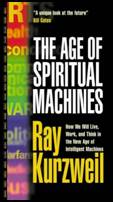|
 Age of Spiritual Machines: How We Will Live, Work and Think in the New Age of Intelligent Machines
Age of Spiritual Machines: How We Will Live, Work and Think in the New Age of Intelligent Machines
By, Kurzweil, Ray
Publisher: Texere
Class No.: 006.3 KUR
Accession No.: 005712
Year: 2001
Pages: 388p.
How much do we humans enjoy our current status as the most intelligent beings on earth? Enough to try to stop our own inventions from surpassing us in smarts? If so, we'd better pull the plug right now, because if Ray Kurzweil is right we've only got until about 2020 before computers outpace the human brain in computational power. Kurzweil, artificial intelligence expert and author of The Age of Intelligent Machines, shows that technological evolution moves at an exponential pace. Further, he asserts, in a sort of swirling postulate, time speeds up as order increases, and vice versa. He calls this the "Law of Time and Chaos," and it means that although entropy is slowing the stream of time down for the universe overall, and thus vastly increasing the amount of time between major events, in the eddy of technological evolution the exact opposite is happening, and events will soon be coming faster and more furiously. This means that we'd better figure out how to deal with conscious machines as soon as possible--they'll soon not only be able to beat us at chess, but also likely demand civil rights, and might at last realize the very human dream of immortality.
The Age of Spiritual Machines is compelling and accessible, and not necessarily best read from front to back--it's less heavily historical if you jump around (Kurzweil encourages this). Much of the content of the book lays the groundwork to justify Kurzweil's timeline, providing an engaging primer on the philosophical and technological ideas behind the study of consciousness. Instead of being a gee-whiz futurist manifesto, Spiritual Machines reads like a history of the future, without too much science fiction dystopianism. Instead, Kurzweil shows us the logical outgrowths of current trends, with all their attendant possibilities. This is the book we'll turn to when our computers first say "hello." --Therese Littleton
|

